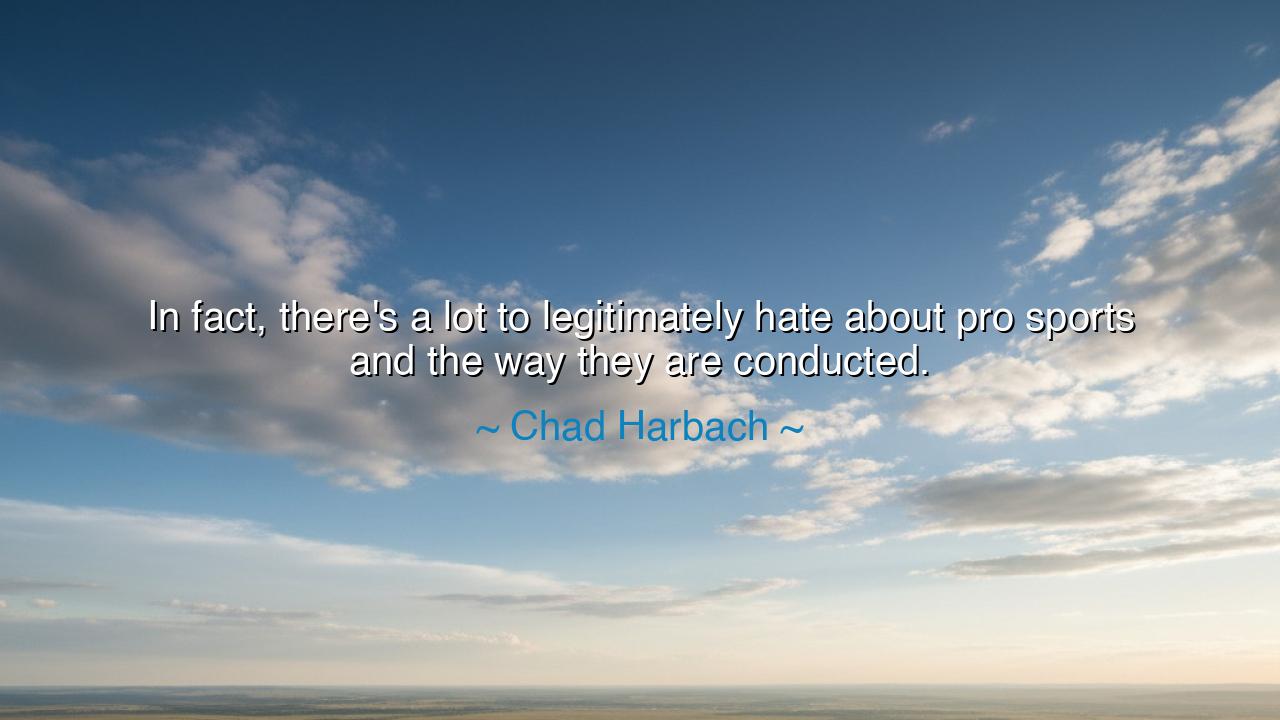
In fact, there's a lot to legitimately hate about pro sports and
In fact, there's a lot to legitimately hate about pro sports and the way they are conducted.






"In fact, there's a lot to legitimately hate about pro sports and the way they are conducted." These words from Chad Harbach strike at the heart of a bitter truth, one that many have long recognized but few dare to speak: the corruption of the purest forms of human competition. At the core of professional sports, once a sacred and honest display of human strength, skill, and spirit, lies a murky world shaped by money, greed, and exploitation. Harbach speaks not of the sport itself but of the system that has taken something once noble and turned it into a commodity. The games, the athletes, and the fans have become part of a larger machine, where profit and spectacle reign supreme, and the true spirit of the competition is drowned in commercialism.
In the ancient world, the very idea of competition was sacred. Consider the Greek Olympians, who competed not for wealth, but for honor, for the glory of their city-states, and the opportunity to be immortalized in legend. The games themselves were a celebration of the human form—an offering to the gods. The athletes competed with dignity, their bodies honed to perfection, but their minds focused not on material gain, but on the pursuit of excellence. There was no thought of money or corporate sponsorships, only the drive to be the best in the purest sense. The essence of sport was its nobility, its capacity to unite people in the pursuit of greatness, not as commodities for sale but as beacons of human potential.
Yet, over time, the great traditions of sport became corrupted by commercial interests. The gladiatorial games of Rome, though once a symbol of martial prowess and civic pride, devolved into a spectacle for the amusement of the masses, with little regard for the well-being of the participants. Similarly, in modern times, professional sports, though often celebrated, have become more about the business of sport than the spirit of it. The corporatization of sports has introduced not only vast wealth, but also exploitation—of athletes, of fans, and of the very ideals of competition. It is here that Harbach’s words echo: there is much to hate in the way pro sports are conducted, for it is a system that places profit over passion, spectacle over substance.
The life of Hercules, that great hero of ancient Greece, is a fitting contrast to the modern professional athlete. Hercules was not driven by wealth, but by a desire for glory, a quest to achieve the impossible in service of the gods. His trials, the labors, were not designed to increase his fortune but to test his very limits and earn him immortal honor. Had his feats been commodified—turned into a business, packaged for profit—would he have undertaken them with the same dedication, the same selflessness? The very idea of turning the sacred into the profitable tarnishes the true meaning of competition, the very thing that Harbach critiques. Sports, like the labors of Hercules, should be about pushing the boundaries of human spirit and ability, not about how much can be extracted from those who participate in or consume it.
When we look to modern sports, we see how the original nobility of competition has been distorted. It is no longer about the athlete striving for personal or civic glory, but about the athlete as an object—one to be marketed, bought, and sold. The fans, too, are caught in this web, lured into emotional attachment not for the love of the game, but for the dollars spent on tickets, merchandise, and broadcasts. The simple joy of the game has been swallowed by the ever-expanding beast of corporate sponsorship and media contracts. In this light, Harbach’s critique is not just a lament for the state of sports today, but a call to return to the roots of competition—a return to the pure, the authentic, and the meaningful.
Thus, the lesson for us is clear: while sports can still be a celebration of the human spirit, we must be vigilant against the forces that seek to commodify it. Like the athletes of old, we must strive to engage in all things—whether in our work, our hobbies, or our pursuits—with a spirit of honor, passion, and integrity. Let us not be blinded by the glitter of corporate sponsorships or the allure of fame. Let us look to the essence of competition and see it for what it truly is: a test of character, a journey of self-improvement, and a way to connect with one another in the pursuit of something greater than ourselves.
In practical terms, this means we must question the systems we support, be they in sport, business, or life. We must ask ourselves: Is this truly a pursuit that serves the human spirit or is it merely a mechanism for profit? How can we, in our own lives, honor the spirit of what is pure, while resisting the forces that seek to turn it into something shallow and exploitable? Harbach’s words are a reminder to look beyond the surface, to dig deeper into the motivations behind the systems we engage with, and to ensure that what we support and participate in truly serves the spirit of the human endeavor, not just the pockets of those who seek to profit from it.






AAdministratorAdministrator
Welcome, honored guests. Please leave a comment, we will respond soon